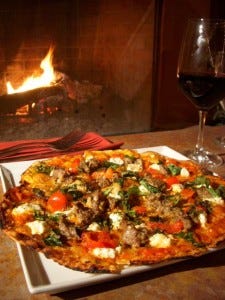Another Wine Country
I've never required much motivation to hop into the car and drive toward wine, food, and fire. But when the lure includes soft, rolling hills bristling with closely-ranked vines, olive trees waving silvery foliage, and lavender puffs busy with visiting bees—why, then, I'm like a randy tom-cat with one simple agenda. Even after five years, the northeast has failed to fully capture my heart. That organ, still unaccountably hopeful after feathering nine nests—and entering into three marriages, all of which were and are intended to be the last—remains forever true to the land of my birth: California.
Twice now, in the past mumble-mumble years, there have been seemingly good reasons to leave California, whether it was college or my pioneer spirit. There's always been a better reason to come back. And the Central Coast of California, specifically Paso Robles and San Luis Obispo, retain the flavor of my old California far better than today's leafy and unequal land of Brentwood.

A few minutes east of Paso there's a little bed & breakfast on a hill, called Villa Valdemosa, with a view that will break your heart if you have ever spent time in Tuscany. This welcoming place is eclectic and personal; you'll feel like the houseguest of it's opinionated and urbane winemaking host-owner, Tom Roebuck. There's a European sensibility in and around the home, not surprising since Tom is a Franco- and Italo-phile who has filled the public spaces with wine-centric reading material and decor. (Note that it's virtually the only choice if Fido's along for the adventure—what's wrong with the innkeepers of Paso? Don't they know we want to travel with our dogs?).
Tom is actively engaged in making wine, as well as music, and if you're of a mind, he'll take you by the hand and share both. This ruggedly handsome sixty-something refugee from myriad past lives tools around town in either an open-topped mercedes or a no-nonsense truck, and is—one feels this is only a temporary situation—a solo player.
He's like a poster-boy for the social viniculture of California's third wine region, languidly begining to catch up with Napa and Sonoma. Here, the price of wine grapes has dropped drastically, and yet every other person you meet makes their own wine. Not all do so with such cellar-rat creativity as Tom: Large vineyards harvest with machines which are unable to take grapes from the last few vines on a row; friendly winemakers let Tom help himself, and from these classy cast-offs comes a wine of depth and personality as bracing and rich as his own. You'll likely not see it in a store, but if you dally for a day or three at his hilltop aerie, you might get to taste, perchance even to buy.
In the last five years, the dining scene in Paso has achieved critical mass. Villa Creek is no longer the only estimable table in town, and the darling of the last several years, Artisan, now has a serious contender for thehot California local-seasonal-sustainable crown. (There's no need to jostle for prominence, however, because a town that's fast growing as the third wine-country touring destination of this great state needs more than two or three great restaurants.) Thomas Hill Organics, started by ex-white-collar farming couple Joe and Debbie Thomas as a venue to present some of the produce from their ten-acre organic farm, makes it possible to vary the dining-out program, deliciously, on a three-day or three-week stay in the area. Educating the public is part of the program here—learning to enjoy produce in the season that nature provides it takes a little getting used to—but there's no proselytizing. Wines come from local vignerons, most using green methods and many of them known to the brand new restaurateurs (and often found hanging out on the luscious patio). Debbie is charmingly disarming about their raison d'etre: "We thought maybe a restaurant would be a good idea," says the professed ex-Nike office drone, who has bucked the trend toward disaster that overtakes the majority of brand new restaurants, especially those helmed by novices. Paso Robles is a terroir in flux, tripped up a bit by the recession, but ready to pick itself up and start moving forward in tasty new directions at the drop of a chapeaux. I can't wait until our next, lusciously longer visit, in January. There is more wine to be drunk, vistas to contemplate, and—more importantly—farmers of tasty pork to seek out and befriend. I'm so there.




